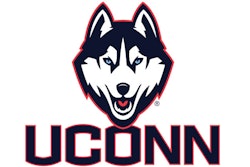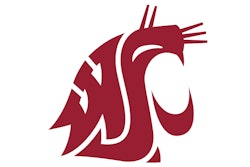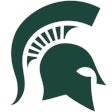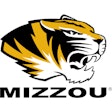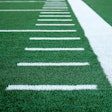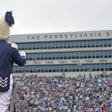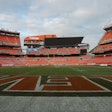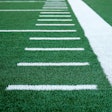Copyright 2018 Crain Communications
All Rights Reserved
Crain's Detroit Business
Detroit City FC can't turn pro until the American soccer system sorts out a court battle, but it's not spending its offseason idle.
Instead, the semi-pro club is turning an indoor ice rink where the Detroit Red Wings once practiced into an indoor soccer hub, investing an undisclosed, privately financed sum to renovate the old City Sports Center indoor ice rink on Detroit's near east side into a 75,000 square-foot youth and adult recreation soccer facility called the Detroit City Fieldhouse.
It's scheduled to open in September.
DCFC, which plays to 5,000-plus fans per match at Hamtramck's Keyworth Stadium, is replacing the building's two rinks with a pair of artificial turf soccer fields, one of which will retain the dasher boards from the hockey configuration.
In addition to turf to replace the ice, the team said it's installing energy-efficient lighting and making cosmetic upgrades. It also said it intends to build a clubhouse for fans and parents to watch games. DCFC co-owner Todd Kropp said the team plans to seek a liquor license for the facility.
"As part of the plans for the facility, a clubhouse will eventually be built between the two playing fields that will serve as a hub of activity for DCFC supporters, as well as a place for athletes and parents to grab a drink and meal. The eventual space will overlook both fields and offer a full bar and kitchen to serve visitors and the region's soccer enthusiasts looking to watch a match with friends," the team said in a statement.
Kropp said the team has signed a five-year lease with the building's owner, Anthony Soave's Detroit-based Soave Enterprises LLC, and the deal includes options for up to 15 years. The fieldhouse closed in 2014.
Soave bought the former Renaissance Racquet Club at 3401 E. Lafayette St. near the Elmwood and Mt. Elliott cemeteries for $2 million in 1993 and converted it into an indoor ice rink.
A spokesman for Soave said the building was closed because hockey use declined. In its heyday, the City Sports Center was a practice facility for the Detroit Red Wings and was home to Grosse Pointe South and University of Detroit Jesuit hockey teams, the Wayne State University women's hockey program, and adult recreational hockey leagues.
Kropp declined to discuss DCFC's financing for the fieldhouse project other than to say it's entirely private. The team had a $1 million operating budget for its most recent season, and relies on a mix of game-day revenue along with corporate sponsorships and merchandise sales.
The fieldhouse, if it catches on, will be another source of income. The lease allows the team to sell corporate sponsorships for the building.
"We do have the option to advertise sponsors at the building, and it's a part of the business plan," Kropp said.
Detroit City said that in addition to renting field time to local adult soccer leagues — the team's co-owner and CEO Sean Mann launched the co-ed rec Detroit City Futbol League in 2010 — it also plans to create formal partnerships with youth soccer programs to use the fieldhouse as a home pitch.
The building is part of Detroit City's effort to build a year-round talent pipeline for local soccer — and theoretically could produce DCFC players — while also generating revenue to operate the club. The building also expands the team's footprint and brand — an ongoing effort in the shadow of Detroit's effort to land a Major League Soccer expansion team to play at Ford Field.
"The goal is to develop a premier facility that serves as a hub for all levels of soccer in Detroit," Kropp said. "We want to do what we can to expand our footprint in Detroit. The indoor facility fits into that. Getting involved with youth soccer a bit more, that's another part of our growth strategy."
The 50-plus Detroit City Futbol League teams, made up of 1,200 residents from different neighborhoods, often have to find suburban locations to play in the winter, and the Detroit City Fieldhouse will be available as a home pitch for them.
"This would give them an option to play in the city," Kropp said.
Other potential uses for the fieldhouse include indoor sports such as flag football and lacrosse, he added.
The fieldhouse project is occupying DCFC's time while it awaits the outcome of a New York court battle before it can turn pro, which has been the team's plan for some time. It currently plays in the semi-professional National Premier Soccer League, but is seeking to move to a higher, professional level of soccer with more full-time staff and paid players.
The hitch has been an ongoing federal antitrust lawsuit by DCFC's possible landing spot, the New York City-based North American Soccer League, against the Chicago-based U.S. Soccer Federation, which sanctions American soccer leagues.
USSF provisionally approved NASL and the Tampa-based rival United Soccer League a year ago as Division II leagues, a step below Major League Soccer atop the American soccer organizational pyramid. Then last fall, USSF rejected NASL's application to remain a Division II league, meaning it could drop to the less attractive Division III, the lowest level of U.S. pro soccer above amateur status. The next level below that, the fourth tier of the soccer pyramid, is where Detroit City FC plays now, with unpaid players.
Division II leagues have to meet criteria such as having 12 teams. NASL doesn't have enough teams, but has said it's in talks with teams that may join it, including DCFC.
The 30-team USL, which is closely tied to Major League Soccer and is considered the more financially stable league, is expected to retain its Division II status and has plans for its own Division II league. DCFC has said it's not in talks to move to the USL.
The NASL on Sept. 19 filed a federal antitrust lawsuit in U.S. District Court for the Eastern District of New York against the soccer federation that alleges it conspired with MLS and its marketing arm, Soccer United Marketing, along with the USL, to limit competition and drive the NASL out of business.
A federal judge in November denied the NASL's injunction request to preserve its Division II status, and the league subsequently filed an appeal that's ongoing.
The other option for Detroit City FC is the new National Independent Soccer Association, a Division III league that's being formed by investors Peter Wilt, a longtime soccer executive, and attorney and consultant Jack Cummins. It said in December it has three confirmed markets (Chattanooga, Connecticut and Miami) and is in talks with others, including DCFC.
When DCFC turns pro hinges on what happens in the courtroom. NASL plays a spring-summer schedule, and NASL is moving to an August-June format, similar to what many international leagues do.
"I think it depends on when that ruling comes down," Kropp said.
Wherever DCFC ends up — and it may stay in the NPSL in 2018 — it will need a deep-pocket principal owner as part of any move to turn pro.
USSF requires a Division II team to have a controlling owner with a $20 million minimum net worth and Division III teams to have a principal owner with a $10 million net worth. None of Detroit City's owners meet that requirement, and Mann said they have had talks with a number of undisclosed potential investors to satisfy ownership requirements to turn pro.
Twitter: @Bill_Shea19
Read More of Today's AB Headlines
Subscribe to Our Daily E-Newsletter
Terms and Conditions Privacy Policy


















